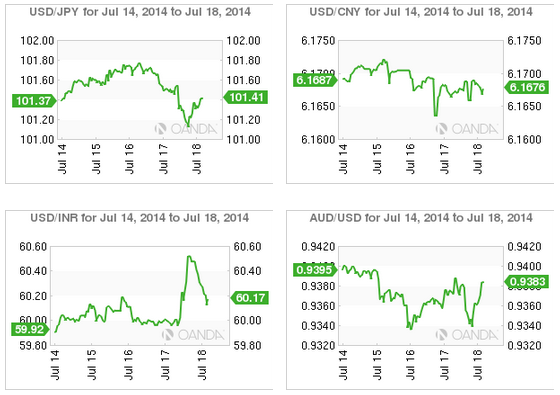- Asia seeks Euro reaction for help
- Australasian risk rejection has been trumped for now
- China's first potential commercial paper default now on the 'clock'
During the first half of this year geo-political events have had a relatively short life span. Will this time around be any different? Despite most global markets so far ending the week with a heavy heart, Asian in particular seems keen to see the reaction from their Euro and American counterparts before wholly committing to the next step.
It's not surprising that investor's first move predictably was of risk rejection in the Asian market, particularly after digesting the MAS flight 17 downing news and the Israel/Gaza offensive. Investor's obvious reaction was to seek sanctuary. This saw equities on the back foot, a bid for bonds and Gold, and a demand for safe haven currencies like the CHF and JPY. The Aussie once again looked 'soft' at the lows AUD $0.9320/25, but like a rising phoenix the currency remains brimming with support at lower levels, allowing the antipodean currencies to begin to retrace their steps (AUD $0.9390 and NZD $0.8682). Perhaps the strongest catalyst for the Asian retracement was to see the ¥101.10 level impenetrable, in fact, it has since been able to push JPY higher.
The first-half investor play was all about the Yen strength against the crosses, but since the Euro trading crossover, the market story has been one of recovery. Investors will want to see how this theme will unfold during the North America session, especially between the US and Russia and after yesterday's terrorist developments before committing to any 'lemming' trading strategy.
Closing Asian session to date:
- AJX stocks were down -0.35%
- Nikkei 225 was the regions biggest loser -1%
- ASX 200 up small +0.9%, strong demand for 5-year Aussie tender
China ripple effect
Making small waves but certainly contained was the chatter of a looming default in China's domestic bond market after a small construction may be unable to repay short-term debt maturing on July 23. Huatong Road and Bridge Group owes +$64.5m in one-year commercial paper. A default would be China's first in commercial paper. The investment is considered small, and with investor's mindset changing -- believing that small is unavoidable while the larger companies are financially sound - the news has done little to disrupt the offshore bond market who are focusing on geopolitical events.
China property sector was very much in focus last night, with the release of June property price data. Across all-70 cities prices fell, m/m, for the 2nd consecutive month, down -0.5% v -0.2% previously, while the y/y price growth slowed to +4.2% from +5.4%. Digging deeper, new home prices rose in just 8 cities vs. 15 in the prior month and fell in 52 cities vs. 35 prior. Existing home sales price declines were pronounced even in the top-tier cities, with 1.3% m/m declines in Beijing and -0.7% in Shanghai. Top property names continue to trade higher on indication of more relaxed sentiment toward easing property curbs.
BoJ June policy meeting minutes
There was nothing out of the blue. The minutes reiterated that Japanese policy makers agree on continued easing until +2% inflation is stable. The BoJ also agreed to monitor risks and adjust policy if needed, while some members saw the easing effects intensifying.
USD/JPY
The dollar's recovery from Friday's Asian session low (¥101.09) is going to find it tough making much headway, especially while resistance at ¥101.44-50 caps the topside. A clean break is warranted to change momentum and bring into play additional upside risk to ¥101.79-85 level. Otherwise, the market is back to playing the tightly contained ranging game.
A Look ahead
Next week is a relatively quiet one for fundamental Yen data. However, the Aussies have CPI and trade to contend with at the beginning and the end of the week, along with a few RBA speeches in tow. On Wednesday, the RBNZ will make its rate announcement, no change expected (+3.25%). In China, HSBC flash manufacturing PMI is presented mid-week.

